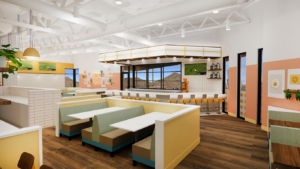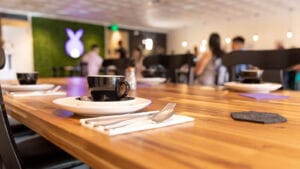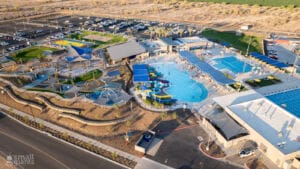Downtown Phoenix has an abundant number of coffee shops, but none like the Fair Trade Café.
Founded “on love” by Stephanie Vasquez in 2007, the café is “the longest-standing coffeehouse in downtown Phoenix owned by a Latina.”
Built on not only love but sustainability, the café is proud to boast that it is 97% green.
“Everything that’s done here, purchased here, brought in and out, is done intentionally,” Vasquez says. All of their coffees and teas are fair trade and organic certified. They compost in-house. Vasquez doesn’t believe that “the customers know how deep [their] sustainability efforts go.”
Elizabeth Thorley, a frequent Fair Trade Café consumer, likes the café not only for its “warm and homey” ambiance but “as someone who’s been involved in different activist activities,” she finds it to be a “very welcoming progressive space.”
The café is progressive in many ways, not just in the ways it practices sustainability. Their prices are comparatively less expensive than the majority of the coffee shops around, while their sizes are larger than most, says Vasquez.
This is done intentionally, she says, because she says “that you should not have to be affluent to enjoy a conscientious, organic cup of coffee.”
Much of the team is made up of DACA recipients and formerly incarcerated persons because everything the café does is “for the better good,” Vasquez says.
Sustainability is in the foundation of this café, but it wasn’t always supported by the market, Vasquez says. “It wasn’t something that consumers were looking for by any means,” but now, as “the green movement is something that has trended recently,” customers search, and can find that trend to be well-alive in the Fair Trade Café.
These sustainable efforts aren’t cheap, however.
One expensive, yet sustainable, business practice that the café not only preaches but practices is that of fair trade products.
Many people are unfamiliar with the full concept of fair trade, so the organization Fair Trade America attempts to account for the unknown information. According to their website, “fairtrade is a way that helps you know that those farmers got a fair deal in growing their goods.”
Fair Trade certification ensures that the farmers that grew the goods were treated properly. A Fair Trade certification on a pack of coffee beans means that “every bean can be traced back to the cooperative of small-scale farmers who grew it,” Fair Trade America writes.
When Thorley thinks of fair trade, she thinks of equity. Much of the world “was built on the pain of people in predominantly black and brown countries,” as they were “exploited for labor and natural resources” by the European countries that colonized them, she says.
Thorley appreciates “when people make an effort to make sure that their coffee is ethically-sourced” because of this very reason.
Fair trade coffee comes with a price, but Fair Trade America says that “the cost is often a function of quality.”
The foundation of the café, “the legs and the heart of it, are on the better good of everything and everyone, including the earth,” making it something they’re unwilling to stray from, regardless of the costs it incurs, Vasquez says.
Despite the hefty price tag that often comes along with sustainability, Vasquez doesn’t find that to be her biggest challenge.
She says that in life “we get in our own way and we don’t think big enough, and we allow things that happen around us, we allow circumstances to take over, rather than standing in front of it and continuing to move forward,” which she cites as the reason she considers herself the café’s biggest challenger.
Vasquez hasn’t let this stop her, as she boasts several accolades. She has been recognized in Forbes’ 40 under 40 list, the Phoenix Business Journal, and more.
The café has also earned awards, many of which they are unaware of. Because the café doesn’t submit themselves for these accomplishments, they win awards because “it’s just things that our customers have just noticed and nominated us for,” Vasquez says.
Most recently, it won the “Recycle Excellence for a Small Business Award” from the Arizona Recycling Coalition in late October. This award is just another added to their long list of honors, including their multiple features in the Best of Phoenix by the Phoenix New Times.
Thorley believes that businesses can take away a lot from the café.
“Sustainability and the success of a business don’t have to be mutually exclusive,” she says. It can, in fact, “add to a businesses’ brand.”
She says that a sustainable business may result in customers who want to purchase sustainable products, “and feel like they’re doing their part to maintain the planet,” which can lead them to spend more on “ethically-sourced materials, ethically including human and environmental ethics.”
Despite sustainable practices often costing more, Thorley says that not only are sustainable businesses “doing their part, but more people might actually want to be patrons for a sustainable business.”
Many businesses that want to practice sustainability either don’t know how to begin or lack the time and energy to learn, Helene Tack, the Director of Sustainability Initiatives at Local First Arizona says.
That’s why she says the Arizona Green Business Program, which is run under Local First Arizona, is a solution for those businesses.
The program takes businesses through a basic checklist, and gives them “a baseline of what they’re doing,” and a “look at how they can improve,” along with some initiatives they can implement that will improve their footprint, as well as “maybe show some return on investment,” Tack says.
Fair Trade Café is a trailblazer for businesses in downtown Phoenix, but although it draws numerous patrons, for those who have yet to experience it, Vasquez says that “you have to come and experience the love that this was founded on.”




